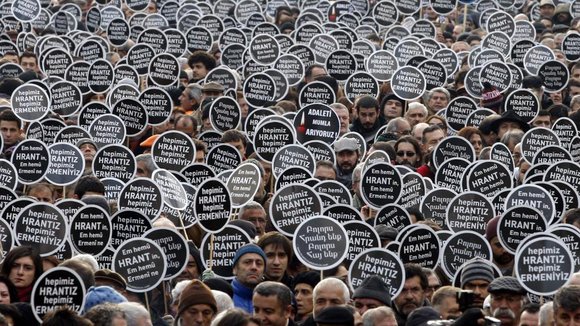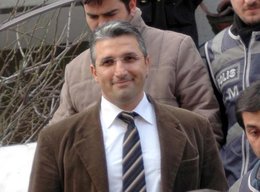Against the Criminalization of Journalism
Turkey ranks 148 of 179 states in the RSF Press Freedom Index. Why?
Erol Önderoğlu: First of all I want to say that this is not a new situation. Turkey has for a long time had a low ranking, but what is new is that violations of press freedom are now taking place in a different form.
During the 1990s when there was a low intensity war between the Kurdistan Workers' Party (PKK) and the state security apparatus, there were all kinds of violations of rights in every field of life, and the press was not immune from this. We can say that journalists were caught in the middle of this war. But from around 2000, when Turkey gained EU candidate status, there were some improvements; for example the declining number of journalists subject to ill treatment in custody – which had been quite common in the 1990s. However, other forms of violations were introduced or increased, besides which the character of the violations changed.
Like what?
Önderoğlu: During the 1990s interventions in the press and violations of press freedoms had essentially militaristic characteristics in various forms, including putting pressure directly on editorial decision making processes, to prevent certain discourses. We witnessed the Legal Department of the Office of the Chief of General Staff opening court cases against journalists or asking civilian courts to do so.
But starting from 2005, after the ruling Justice and Development Party (AKP) came to power, militaristic pressure was replaced by a different one, one that is not written down on paper.
Can you elaborate?
Önderoğlu: Before AKP rule there was media owner capital that pursued its own interests. The AKP came to power with its own social and economic structure; with its own financial circles, capital; and with its own associations and foundations. So this new capital that came to power with the AKP entered the media sector. It can be seen as the end of the capital monopoly in Turkish media, but in fact this is not really the case; these newcomers created a new equilibrium.
The former media capital, with the fear it might be excluded from the new power centre, started to take action to please the government. For example, the prime minister criticised journalists, and did so very openly; these journalists lost their jobs. These kinds of impositions took place behind the scenes.
I guess direct or indirect pressures based on financial concerns were not the only source of violations of press freedom?
Önderoğlu: No, not at all. First of all, I have to underline that the RSF criteria when performing its ranking is very clear and based on approximately 50 different parameters – and these are the same for every country. If we go back to these parameters, we can say that there are daily violations in Turkey; for example any kind of physical attack on a journalist.
Every year more than 30 journalists are attacked in Turkey. The public pays attention to politically motivated attacks, but journalists writing about the mafia or interest groups or corruption have also been attacked.
Regarding politically motivated crimes against journalists, as in the Hrant Dink case, the courts are punishing those who pull the trigger but not the dark forces behind these assassinations.
Turkey has made some legal reforms to improve basic rights. Why has it been unable to move up from its low ranking when it comes to press freedom?
Önderoğlu: These reforms have been made without the involvement of civil society, and their essence is not based on the enlargement of freedoms.

Besides that, the Counterterrorism Law and the Turkish Penal Code still heavily restrict the media. Articles regulating the publication of statements by illegal organisations are very open to misuse. These articles should be regulated in accordance with media freedom.
There are articles envisioning the cessation of a publication; this means censorship. There are more than 20 articles in the Turkish Penal Code that increase penalties if certain so-called crimes are committed via the media. There are other laws that brought the prohibition of access to certain Internet sites, including YouTube.
Independent journalists like Nedim Şener and Ahmet Şık recently faced court charges, they were even taken into custody. The authorities claim they were not arrested for their journalistic activities but for alleged involvement in terror networks. What is you comment on this?
Önderoğlu: We have witnessed many scandals in the judicial process in the past, and in this respect the indictments do not always convince us. Of course the authorities say we are not putting those people on trial due to their journalists activities, but on other charges. We ask ourselves whether these investigations and indictments against these journalists have been prepared on the basis of universal rules of law. Most of the time we are not convinced.

These are new forms of oppression and we want a media environment in which people are free from all kinds of state pressure and court assaults. Such cases simply mean the criminalization of journalism.
In addition, I think in our society awareness is not that strong; I mean, maybe there is awareness but there is also apathy. Society does not think, "These people are working for us, they are trying to inform us and when they are doing this they are taking risks."
So when and how can Turkey upgrade its press freedom ranking?
Önderoğlu: Actually its road is very clear; everybody knows the necessary reforms and the necessity of establishing a new policy based on freedom and universal rules. But the unproductive discussions between government and the opposition based on daily exchanges of words and accusations prevent this. There needs to be political consensus for improvement, and civil society should be part of this. Then we can set out on a constructive road.
Interview conducted by Fatma Kayabal
© Qantara.de 2012
Qantara.de editor: Lewis Gropp
